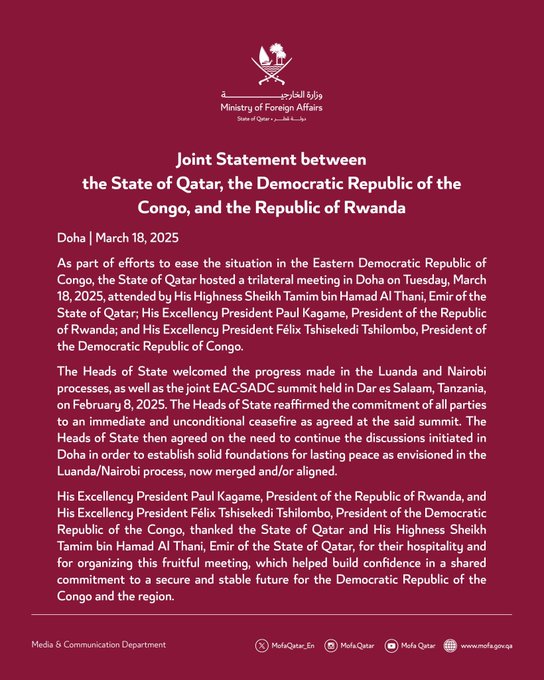A Diplomatic Push for Peace
Nairobi, Kenya- After years of conflict in eastern Democratic Republic of Congo (DRC), Presidents Félix Tshisekedi and Paul Kagame have agreed to a ceasefire—again.
The deal, brokered by Qatar’s Emir Tamim bin Hamad Al Thani, marks yet another attempt to stabilize the rebel-controlled region.
Tuesday’s high-stakes meeting in Doha reaffirmed support for ongoing peace efforts, including the Luanda and Nairobi processes and the joint East African Community (EAC) and Southern African Development Community (SADC) summit held last month in Tanzania.
In a statement, Qatar’s Foreign Ministry confirmed: “The Heads of State reaffirmed the commitment of all parties to an immediate and unconditional ceasefire as agreed at the said summit.”
The big question now: Will this truce hold, or is it just another fleeting promise in a long cycle of ceasefires and renewed fighting?
M23 Rebels, FDLR, and the Regional Blame Game
Eastern DRC has been a hotspot of conflict, largely due to the presence of the M23 rebel group, which Kinshasa insists is backed by Rwanda—a claim Kigali has repeatedly denied.
Instead, Rwanda argues it is only defending itself from the Democratic Forces for the Liberation of Rwanda (FDLR), a group with roots in the 1994 genocide.
While the two leaders agreed to continue peace talks, Kagame specifically emphasized the need to:
- Address the FDLR issue, which Rwanda sees as a direct threat.
- Engage in direct political dialogue with M23, a point Kinshasa has been reluctant to embrace.
“The need to address the issue of FDLR genocidal forces and to have security guarantees for Rwanda and the region was also emphasized,” Kagame’s office stated.
President Paul Kagame and DRCongo’s Tshisekedi met in Doha, hosted by Qatar’s Emir Sheikh Tamim bin Hamad Al Thani, to discuss the crisis in eastern DRC. The leaders reaffirmed their commitment to an immediate and unconditional ceasefire and agreed to continue dialogue for…
Meanwhile, the DRC’s presidency echoed the commitment to a ceasefire, adding that implementation details would be released soon.
Despite the diplomatic progress, peace in the region remains fragile. Previous ceasefires have been short-lived, with fighting resuming after brief lulls.
The real test will be how both nations implement and enforce this agreement.For now, leaders are putting their faith in regional peace frameworks and continued discussions in Qatar.
But whether this agreement will lead to lasting stability—or just another cycle of violence—remains to be seen.






